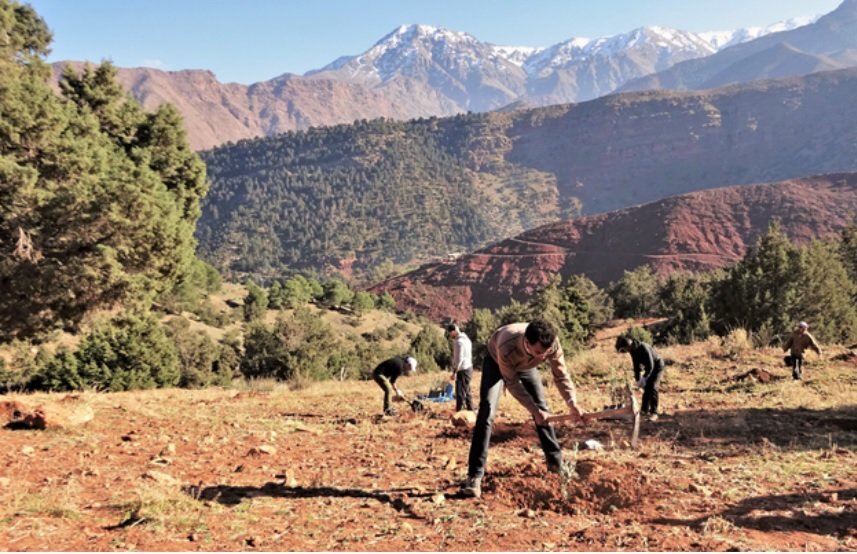By Yossef Ben-Meir | President
Morocco’s Need for Trees
According to Morocco’s Ministry of Agriculture, one billion fruit trees and billions of medicinal plants are needed as one of several essential contributions in order to overcome poverty in rural areas, which afflicts approximately 80 percent of its people. In addition, drylands cover 97 percent of Moroccan land, being one of the world's best long-term carbon sinks it requires immediate action to halt irreversible degradation of soils.
Obstacle to Transition
Farming families in Morocco are economically compelled to transition toward fruit tree agriculture and away from traditionally growing barley and corn. These staple crops are currently cultivated on 70 percent of agricultural land, yet only generate 10 to 15 percent of agricultural revenue. To address this obstacle to sustainable livelihoods, rural communities must build nurseries to grow from seeds the fruit trees and medicinal plants they need to cultivate in their localities. However, farming households cannot dedicate their land to build nurseries because their survival requires sowing and harvesting every year. Therefore, the in-kind contribution of land for people’s nurseries is vital to meet the demand for trees of rural families.
Partners for Land In-Kind
The High Atlas Foundation (HAF) receives land lent in-kind for the nurseries of farming communities from government agencies, universities, and civil groups, including the High Commission of Waters and Forests, the Ministry of Culture, Youth, and Sports, the Ministry of Education and Professional Development, University Sidi Mohamed Ben Abdellah in Fes, Al Akhawayn University in Ifrane, the Moroccan Jewish community, and cooperatives.
HAF Nurseries: Millions of Trees
Currently the High Atlas Foundation manages twelve tree nurseries in seven provinces of Morocco. At maximum capacity, they can currently grow 1.6 million organic fruit saplings grown from native seeds. In addition to these twelve locations of community-managed nurseries, the High Atlas Foundation has also been lent land without cost from the above agencies to build 13 new nurseries of relatively large size, that if planted to their capacities, includes the generation of approximately 10 million trees per year.
Carbon Sequestration
Based on HAF calculations in consultation with carbon offset experts, the planting of 10 million fruit trees will generate approximately 425,000 verified carbon units (VCUs). To secure these units, monetize their value, and account for their CO2 offset benefit, the trees require monitoring twice during the first five years. While VCU’s are usually stored up to 150 years in living trees, due to the unique climatic conditions of Morocco, carbon is transformed into stabilized hummus, remaining in the soil for up to 1,000 years. HAF commits to sustainable long-term carbon storage, providing the wrap-around service of constructing and maintaining the nurseries, transplanting them with farming families, cooperatives, and education centers, while monitoring
and registering the data. Ten million trees impact approximately 40,000 rural households, including 200,000 people, while cooling the climate globally.
Low Cost Offsets
HAF is able to provide tree planting, monitoring, and the required data to secure CO2 offsets at the low cost of $0.55 per tree due to these contributing factors:
1. We grow the saplings from seeds, which allows us to retain significant value, spending only 16 to 25 percent of the private sector price per tree, depending on the variety.
2. The lending of free land by public and civil agencies further reduces costs and price-per-tree unit.
3. The utilization of local fruit seed varieties not only significantly enhances biodiversity, but enables seed procurement in close proximity to the nurseries, reducing transportation costs and increasing survival rates.
4. Nurseries are maintained by local community members who receive from the HAF a fair salary plus benefits, including health insurance and social security, with seasonal workers also coming from the neighboring vicinity. Thus, labor costs are relatively modest with a high level of commitment and satisfaction.
5. Finally, the trees are distributed to the farmers, where capacity building workshops on effective tree planting and care play a key role in maintaining the HAF’s outstanding tree survival rate. Farmers pay $0.20 per tree, and the entirety of that amount is reinvested in seeds in order to replenish the nurseries, provide for their caretaking, and continue the generation of young trees for subsequent years.
Project reports on GlobalGiving are posted directly to globalgiving.org by Project Leaders as they are completed, generally every 3-4 months. To protect the integrity of these documents, GlobalGiving does not alter them; therefore you may find some language or formatting issues.
If you donate to this project or have donated to this project, you can recieve an email when this project posts a report. You can also subscribe for reports without donating.
Support this important cause by creating a personalized fundraising page.
Start a Fundraiser